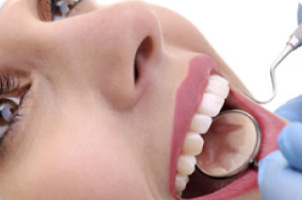Gum Disease-Factors and Prevention
Adults over the age of 35 lose more teeth as a result of periodontal disease than from cavities. Three out of four adults are affected at some time in their life. The best way to prevent periodontal disease is by daily thorough tooth brushing and flossing techniques, along with regular professional examinations and cleanings. Unfortunately, even with the most diligent home dental care, people susceptible to periodontal disease due to genetic factors still can develop some form of periodontal complications. Once this disease starts, professional intervention is necessary to prevent it from progressing to loss of natural teeth.
Other important factors affecting the health of your gums include
- Tobacco usage
- Diabetes
- Stress
- Clenching and grinding teeth
- Medication
- Poor nutrition
Periodontal Disease & Tobacco
 You are probably familiar with the links between tobacco use and lung disease, cancer, and heart disease.
You are probably familiar with the links between tobacco use and lung disease, cancer, and heart disease.
Current studies have now linked periodontal disease with tobacco usage. Patients who smoke heavily have more severe periodontal disease and greater tooth loss than non-smokers. There is a greater incidence of calculus formation on teeth, deeper pockets between gums and teeth as well as greater loss of the bone and fibers that hold teeth in your mouth. In addition, your chance of developing oral cancer increases with the use of all forms of tobacco.
Chemicals in tobacco such as nicotine and tar slow down healing and the predictability of success following periodontal treatment.
Age
Studies indicate that older people have the highest rates of periodontal disease. Data from the Centers for Disease Control and Prevention indicates that over 70% of Americans 65 and older have periodontitis.

Genetics
Research has indicated that some people may be genetically susceptible to gum disease. Despite aggressive oral care habits, these people may be more likely to develop periodontal disease. Identifying these people with a genetic test before they even show signs of the disease and getting them into early intervention treatment may help them keep their teeth for a lifetime.

Stress
Stress is linked to many serious conditions such as hypertension, cancer, and numerous other health problems. Stress also is a risk factor for periodontal disease. Research demonstrates that stress can make it more difficult for the body to fight off infection, including periodontal diseases.

Medications
Some drugs, such as oral contraceptives, anti-depressants, and certain heart medicines, can affect your periodontal health. A serious problem related to medications is “dry mouth syndrome.” Just as you notify your pharmacist and other health care providers of all medicines you are taking and any changes in your overall health, you should also inform your dental care provider.

Clenching Or Grinding Your Teeth
Clenching or grinding your teeth can put excess force on the supporting tissues of the teeth and can cause chronic loss of bone support. This weakens teeth and may result in progressive loss of natural teeth.

Poor Nutrition
A diet low in important nutrients can compromise the body’s immune system and make it harder for the body to fight off infection. Since periodontal conditions often involve infection, nutrition can impact our patients directly.
